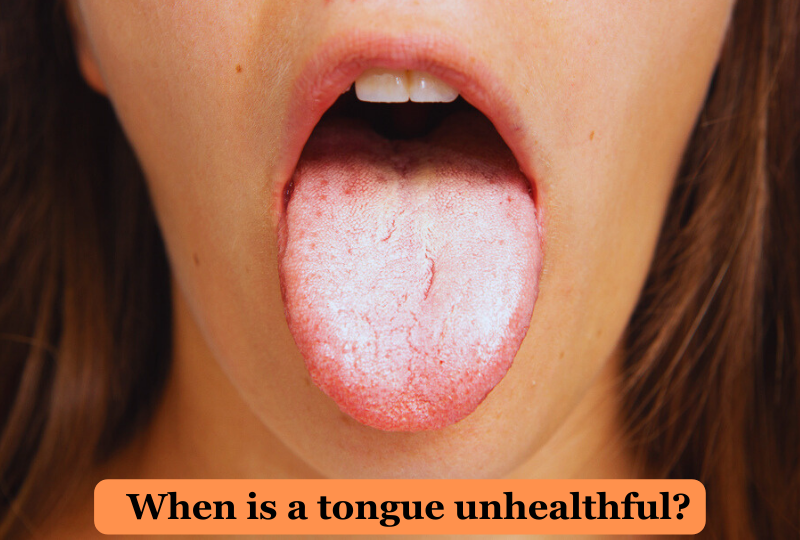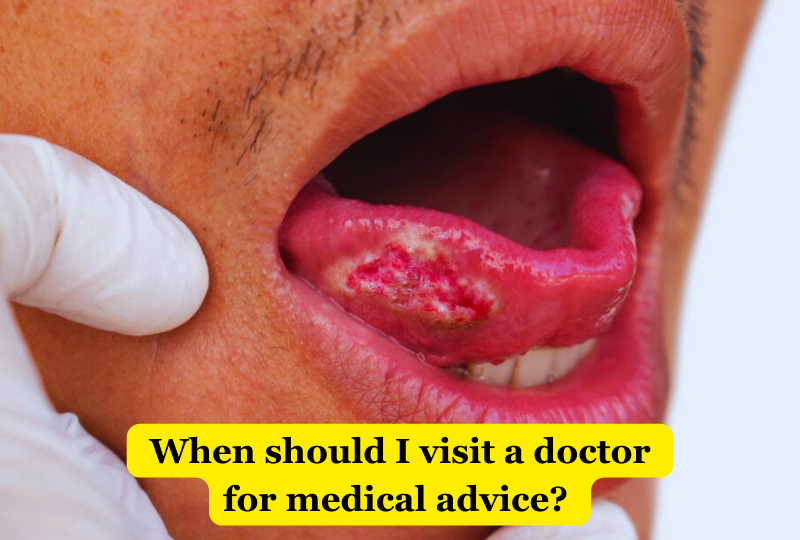Physical Address
304 North Cardinal St.
Dorchester Center, MA 02124
Physical Address
304 North Cardinal St.
Dorchester Center, MA 02124

The tongue health is most important for every person. Human tongue is a remarkable invention. It enables you to engage with individuals around you, contains millions of unseen taste receptors that transform food into pleasure, and, with any chance, allows you to passionately kiss a loving partner.
Additionally, it can help you learn more about your health, including any diseases, infections, or nutritional deficiencies you could have. Because of this, it is important to know what a healthy tongue is like, which is what we shall demonstrate in this essay.
The tongue should be symmetrical and rounded. Although people from Africa, Asia, and the Mediterranean may exhibit purple or brown pigmentation, it is often pale pink in color. It could also be faintly coated with white. When you eat, the coating helps avoid scratches on the tongue since it is composed of the fluffy protein keratin.
Your tongue is covered with tiny bumps (called papillae) that have a variety of functions.
They let you to feel warmth and touch, taste, and form a little ball of food (bolus) that you may swallow. They also include taste buds that let you know whether a meal is sweet, salty, sour, bitter, or salty.
Your tongue has a wealth of information about your general health. What does your tongue sound like typically?
The color of a healthy tongue is pinkish-red. The mucous membrane, a wet layer of tissue, covers the tongue outside.
You’ll also see little lumps on the back of your tongue known as taste buds if you stick your tongue out in front of the mirror. Your taste buds include those that allow you to detect the sour, sweet, or salty flavors of food.

An abnormally different shade of pink from the usual tint you’re used to seeing on your tongue is one of the first obvious signs of an unhealthy tongue.
In addition to new lumps and bumps, eating, drinking, and swallowing discomfort are potential indicators of anxiousness. Possible causes of color-based speech abnormalities include the following: Only informative in nature, this list. If you experience any of these changes, contact your physician straight away.
You could be experiencing health issues if the color of your tongue isn’t regular pink. Other tongue colors and their possible meanings are listed below.
Red: An uncomplicated vitamin B deficiency that may be treated with supplements may be the cause of a red tongue (not a dark pink tongue). Your tongue may also become red if you have Kawasaki illness, eczema, or scarlet fever. Geographic language is a very uncommon yet un-harmful disorder characterized by red patches with white outlines around the tongue.
Purple: Your tongue may turn purple if you have heart issues or poor circulation in general. Kawasaki illness can also cause a purple tongue.
Blue: A blue tongue may be a sign that the blood is not getting enough oxygen. This might be the result of renal or lung illness.
Yellow: If you smoke or chew tobacco, your tongue could seem to be yellow. A yellow tongue can occasionally also be brought on by psoriasis and jaundice.
Grey: Digestion issues can occasionally make your tongue grey. Eczema or stomach ulcers can also be to blame.
White: Growing white patches on the tongue’s surface are often the reason of its appearance. They are typically brought on by fungi, such thrush. These stains can be eliminated with antifungal drugs. The emergence of white lines in the mouth, such as those produced by leukoplakia or lichen planus, can also result in a white tongue. Leukoplakia can occasionally progress to malignancy.
Brown: What you eat and drink is the main source of this, which is typically innocuous. Smoking, a terrible habit that may result in oral cancer tongue symptoms including ulcers, is another reason for dark tongues.
Black: Bacteria caused by inadequate oral hygiene practices are frequently blamed for the dark brown to black tongue. Diabetes is another factor that may contribute to a black tongue. Your taste buds may occasionally grow in number and seem hairy, which is a symptom of the benign illness known as black hairy tongue.
Who Is Jeanette Adair Bradshaw: Legendary Actor Morgan Freeman’s Divorced Wife
Both flossing and brushing your teeth twice a day are necessary for good oral hygiene. Use the brush on your tongue for a few seconds.
Lean forward with your tongue extended, allowing the toothbrush to travel along the left, right, and center of your tongue. This will assist in removing dirt and germs that collect on the taste buds.
Some people really believe in using a tongue scraper to clean their tongue. Although Dr. Jiang is not a zealot, he has no objections to someone utilizing a device that spreads over the tongue in a similar manner to how it is cleaned. She claims that there is conflicting evidence about tongue-scratching’s efficacy. The key to maintaining the healthiest possible tongue, teeth, mouth, and gums is what you’re willing to accomplish on a regular basis.

Contact your doctor if any of these symptoms worry you and there isn’t a clear temporary reason. We advise you to see a doctor if you have concerns about your tongue’s color or any changes in your feeling.
If you experience issues with your teeth or gums, such as bleeding, gum discomfort or swelling, or a toothache, schedule an appointment with your dentist.
There are many helpful aspects of your tongue. You may use this to taste and consume meals while conversing with pals about the most recent events. However, it might also provide details about your general state of health.
Speak with your doctor if you notice that your tongue is not the typical shade of pink or has sores or thick areas that resemble cottage cheese.
Can stress harm the health of your tongue?
Stress-related behaviors, such as teeth grinding or tongue biting, can have an adverse effect on the health of the tongue.
Do some meals help maintain the health of the tongue?
Fruits and vegetables, which are foods high in vitamins and minerals, support the health of the tongue as well as the mouth as a whole.
Can tongue scrapers help you maintain a healthy tongue?
Yes, utilizing a tongue scraper can aid in improving the health of the tongue by removing dirt and bacteria from the tongue’s surface.
Do I still need to wash my tongue after brushing my teeth?
Yes, tongue cleansing is essential because it gets rid of the bacteria that causes foul breath and keeps the tongue healthy.
Can tongue health impact how we perceive flavors?
Yes, the tongue’s condition has an impact on how flavor is perceived. Your capacity to taste and enjoy food is improved by having a healthy tongue.
Resource Health
[…] When is a tongue unhealthful? […]